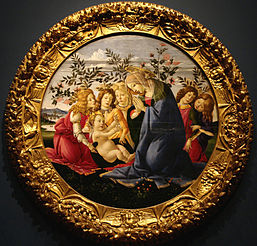
Back التعبد المريمي Arabic Mariánská úcta Czech Marienverehrung German Kategorio:Kultado de Maria Esperanto Devociones marianas Spanish Mária-tisztelet Hungarian Devosi Maria ID 聖母マリアへの信心業 Japanese Penghormatan terhadap Maria dalam Gereja Katolik Malay Mariaverering Dutch

| Part of a series of articles on |
| Mariology |
|---|
 |
| General perspective |
| Specific views |
|
|
| Prayers and devotions |
| Ecumenical |
|
|
Marian devotions are external pious practices directed to the person of Mary, mother of God, by members of certain Christian traditions.[1] They are performed in Catholicism, High Church Lutheranism, Anglo-Catholicism, Eastern Orthodoxy and Oriental Orthodoxy, but generally rejected in other Christian denominations.
Such devotional prayers or may be accompanied by specific requests for Mary's intercession with God.[2][3] There is significant diversity of form and structure in Marian devotions practiced by different groups of Christians. Orthodox Marian devotions are well-defined and closely linked to liturgy, while Roman Catholic practices are wide-ranging—they include multi-day prayers such as novenas, the celebration of canonical coronations granted by the Pope, the veneration of icons in Eastern Christianity, and pious acts which do not involve vocal prayers, such as the wearing of scapulars or maintaining a Mary garden.[4]
Marian devotions are important to the Roman Catholic, Eastern Orthodox, Oriental Orthodox traditions, as well as some Anglicans and Lutherans, but most Protestants do not accept them, because they believe such devotions are not widely promoted in the Bible. They believe this devotion may distract attention from Christ.[5] According to practitioners, devotion to the Virgin Mary does not amount to worship, which is reserved for God. Both the Catholic and Orthodox traditions view Mary as subordinate to Christ, but uniquely so, in that she is seen as above all other creatures. In 787 the Second Council of Nicaea affirmed a three-level hierarchy of latria, hyperdulia, and dulia that applies to God, the Virgin Mary, and then to the other saints.[6][7]
- ^ Directory on Popular Piety and the Liturgy 2001.
- ^ Marmion, Columba. Christ, the Ideal of the Priest, 2006 ISBN 0-85244-657-8 p. 332
- ^ Burke, Raymond L.; et al. (2008). Mariology: A Guide for Priests, Deacons, Seminarians, and Consecrated Persons ISBN 978-1-57918-355-4 pages 667-679
- ^ "Catholic Encyclopedia: Popular Devotions". Retrieved 16 December 2014.
- ^ Hillerbrand, Hans Joachim, 2003. Encyclopedia of Protestantism, Volume 3 ISBN 0-415-92472-3 page 1174
- ^ Smith, Philip. The History of the Christian Church, 2009 ISBN 1-150-72245-2 p. 288
- ^ Trigilio, John and Brighenti, Kenneth The Catholicism Answer Book 2007 ISBN 1-4022-0806-5 p. 58
© MMXXIII Rich X Search. We shall prevail. All rights reserved. Rich X Search